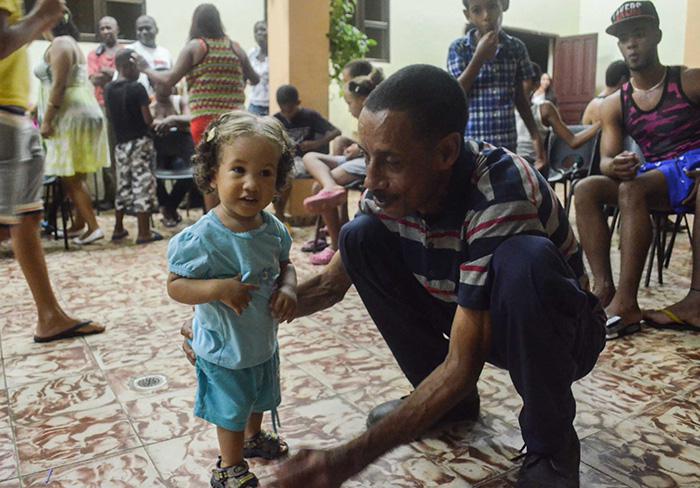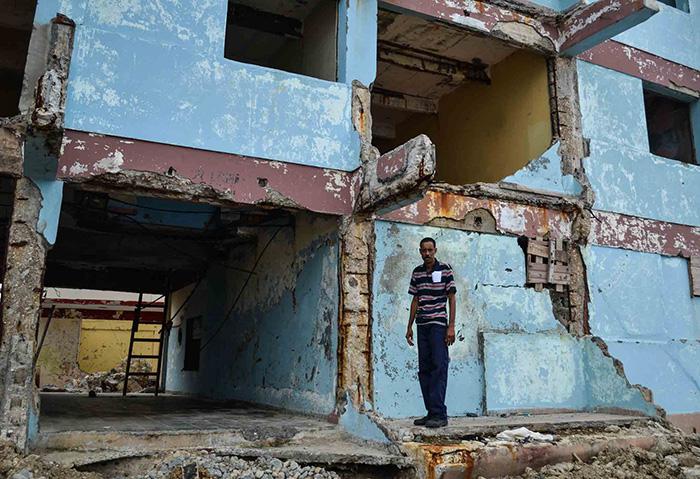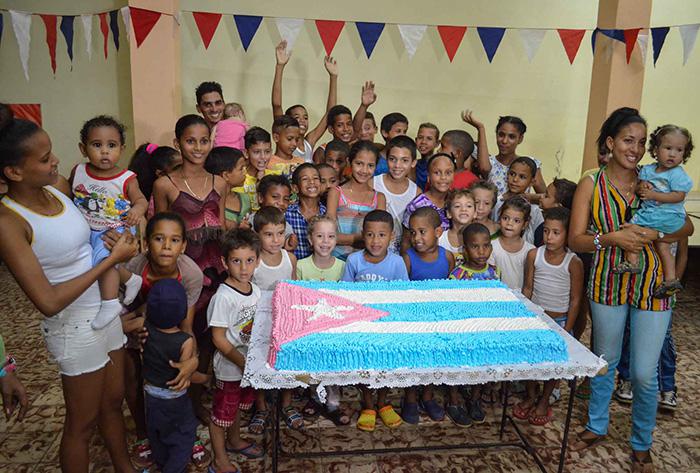
BARACOA, Guantánamo.—While 11 month old Lianet sleeps in a small evacuation center, her grandfather is about to become a hero.
Rocking in her mother’s arms, Lianet looks like a restless, dainty little cherub.
As she sleeps, in the midst of the storm, Gonzalo hangs from the door of a van as it makes its way along the street which runs parallel to the seawall (Malecón) a narrow avenue with buildings facing the coast. Huge waves crash over the sea wall making it invisible while unrelenting winds shake buildings and uproot trees and street-lamps.
Its nighttime and the only light around comes from the van’s headlights. From the vehicle Gonzalo can see flashlights blinking in buildings. He gets out and runs to a building with only a T-shirt covering his head. He kicks in the door, rescues people, and guides them safely to the van. He has no search and rescue training.
At about 2:30am, carrying them on his back, Gonzalo transports the last person to safety. Lianet opens her eyes and gurgules. She sucks on a pacifier.
***
It sounds like an adventure story

"You bet!" he shudders, "There were a couple of other CDR (Committees for the Defense of the Revolution) members who helped me to carry shouting, crying children and adults. It was total chaos. Roofs flying about, walls falling down…Some people didn’t want to leave; because they didn’t think that the sea would be able to penetrate inland over 400 meters, but the water reached half way up their bodies. Buildings collapsed. The only thing you could feel was the wind. And the only visual means of communication we had were flashlights, which we switched on and off. It was like 2am."
It’s the day of Lianet’s first birthday and Gonzalo is sitting on a ramp in front of the Rodney Coutín School’s basketball court. He is a tall ungainly man, trying to speak above the music coming from the classroom, now evacuation center, where he is being housed with his family.
There are kids running about.
Someone approaches with two cups and a thermos of coffee.
"We didn’t even have time to look, we just heard shouts and collapsing roofs, saw blankets flying out of buildings, and the odd car passing by in the darkness.
I was getting people out and putting them in the van or I took them straight to the childcare center where we were offering shelter. It was completely full. We opened the van doors and people shone flashlights so we could see them, someone else came out to collect the arrivals, while others hurried inside shouting: I left my dog; or let me go and find such-and-such, I don’t know where it is."
Gonzalo Rojas García has been the delegate for circumscription eleven - which encompasses almost the entire seawall area – for 10 years.
1,493 people live in his zone, including 405 children.

"We weren’t scared; we didn’t have time to be. At that moment ,the only thing you have time to do is react, look around: there’s a light, that person stayed behind, we’ve got to go and get them. You just focus on getting people in, getting them in, saving lives. The only thing I thought about were my children, both my parents who had been evacuated; my granddaughter. I told them they had to stay there because I had to look after of the rest of the evacuees, take care of them. There were windows in danger of breaking."
***
People began to be evacuated days before Matthew hit.
Children were prioritized.
A car with a speaker drove around the municipality calling for cooperation.
Sick people were prioritized.
Seeing the responsible attitude of all delegates, the government put them in charge of overseeing evacuation centers.
The most vulnerable areas were prioritized, those closest to the sea, and dilapidated houses.
Pregnant women and elderly people were prioritized.
“We provided shelter to 31,755 people in 62 evacuation centers before and during Matthew,” stated Eduardo Zorrilla Romero, vice president of the Municipal Assembly of People’s Power and president of the Baracoa Evacuation Committee. Giving a break-down of the figures he noted that 9,096 people were taken to state facilities; some 250 others to caves, while the rest (22,659) were put up by friends and neighbors.
He also explains that 16 rustic huts were built to house 16 families.
However, some people refused to be evacuated. The same people who used their flashlights to signal for help during the storm.
Gonzalo rescued 75.
"At that time I wasn’t thinking about what might happen to me. You forget about the risks. Nor did I think about what could be happenining to my house. I knew, given the magnitude of past events that it was unlikely that anything would remain of my house. I knew that the area was going to be vulnerable as it's always been, because the sea had already caused some damage. And with Matthew was a category four hurricane, I was almost certain that it was going to devastate the zone."
You prioritized the people…
"Its something instinctual. It’s something that you feel; that comes from inside. It makes me happy to know that I saved so many people."
***
A total of 7,307 Baracoa residents were unable to return home following Hurricane Matthew. Zorrilla describes the situation as extremely difficult; everything happened very fast, and now 311 inhabitants are still staying with neighbors, while the state is providing for 529 people housed in 14 facilities being used as evacuation centers, including schools, polyclinics, workshops, and military units.
“Of these 529,” he states “we have supplied 48 with roofing for their houses." "However,” he adds, “42 families - or 131 individuals from the area around the Malecón - have not yet been able to return to their homes.”
***
At about 5 am Gonzalo does a head count, checks the windows and doors, and makes sure everyone is OK. A little while later, he sets off to visit his house in the very same van supplied by the government to evacuate people.
“We left quickly in the morning, the eye of the storm had only just passed over, and we went to see how our homes had fared. It was devastating, people were on the floor crying.”
- Did you cry?
“I shed a few tears.
"It was harder the next day when I told my parents. I didn’t feel bad for me, but because my folks had renovated the house three times. Every time we had a storm, they had to pay for repairs… And knowing that the house, where all your memories are, suddenly isn’t there…It’s terrifying, you can’t even speak, because you're thinking about so many things all at once.
Thinking about the fact that you’re the only son, and how difficult it’s going to be to recover… it's hard for people to understand, but you have to, because the recovery is going to take a long time.”
Gonzalo’s house is just one of 202 totally destroyed by the Hurricane.
Meanwhile, there were also 302 partially collapsed buildings; 52 without roofs, and another 67 which suffered some degree of damage.
"My wife hasn’t returned to the house yet. It brings back bad memories.
It was just as devastating when Hurricane Ike hit the country nine years ago. The wind swept away balconies, destroyed beams. On that occasion we worked like a mini-brigade, and were able to rebuild the house. Its not easy to think that at that time the state invested, we invested, we repaired, and now the building has a cancer that can’t be cured.
***
“For cases like this,” explains Zorrilla “we put together a center for those in need of assistance in Toa, in order to provide them with temporary housing. The center, which has a management body, follow-up personnel, and a team in charge of maintaining internal order, will guarantee that these individuals receive vital supplies, including; medical care, water storage, food, communications and electricity….
"It also has communal areas to wash clothes, and for recreational activities; as well as a kitchen, dining room, bathroom and TV room.”
***
Walking around with Gonzalo can take four to five hours. He is a popular man. He greets people, shaking their hands; someone stops him to chat for a while; then someone invites him in to their house for coffee.
“In order to win people’s trust you have to enter into their daily lives. Feel part of it. Walk around. You’re resolving problems 24/7. You almost never sleep. You’ve got to be there constantly."
Even now, as we speak, someone interrupts shouting: “Hey, Gonzalo you’re in the paper.” He smiles.
"Being a delegate is a challenge. The people have the last word. But if I’m nominated and chosen, I accept the responsibility, although it’s a difficult one. Everyday there’s something new. You have to deal with different kinds of people. But I don’t want thanks. My priority is getting up every day and heading straight down there, to the constituency."
What about your granddaughter?
“She’s our hope. She’s what we live for. But she’s a handful! Look what time it is, but she should still be wide awake.
Some kids playing on the basketball court in front of us take a shot with a taped-up ball.
The same kids who not two hours ago were singing Happy Birthday to Lianet around a cake.
“Its going to get dark soon,” Gonzalo says, slapping me on the back, “Lets go play with the kids.”















